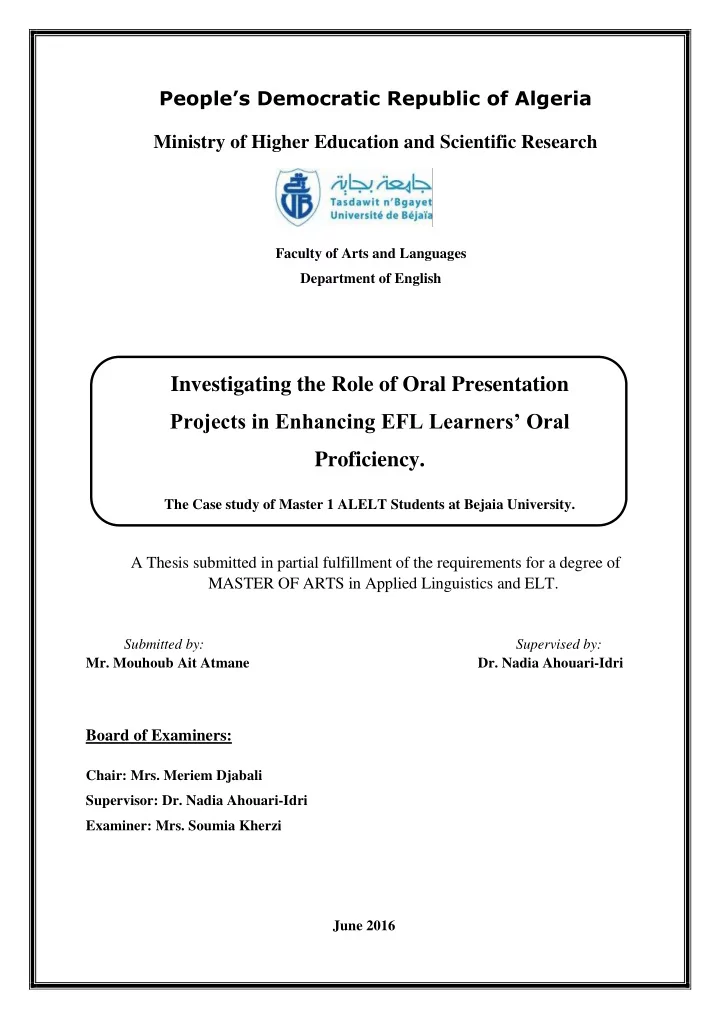

People’s Democratic Republic of Algeria Ministry of Higher Education and Scientific Research Faculty of Arts and Languages Department of English Investigating the Role of Oral Presentation Projects in Enhancing EFL Learners’ Oral Proficiency. The Case study of Master 1 ALELT Students at Bejaia University. A Thesis submitted in partial fulfillment of the requirements for a degree of MASTER OF ARTS in Applied Linguistics and ELT. Submitted by: Supervised by: Mr. Mouhoub Ait Atmane Dr. Nadia Ahouari-Idri Board of Examiners: Chair: Mrs. Meriem Djabali Supervisor: Dr. Nadia Ahouari-Idri Examiner: Mrs. Soumia Kherzi June 2016
Dedication I dedicate this modest work to my Family, my Friends and Colleagues. Thank you all for your help and support. i
Acknowledgment I would like, first of all, to thank Allah for giving me strength and motivation to carry out this work. I would like also to extend my infinite gratefulness for my teacher and Supervisor Dr. Nadia Ahouari-Idri . I cannot thank her enough for her valuable guidance and advice. She was a support for me not only for completing this thesis, but during two complete years. Thanks a lot... I also thank all teachers of Applied Linguistics and English Language Teaching for their unconditioned help and understanding. To them I say, “Thank you very much” . My Thanks and Appreciations go to my colleague students of Master 2 ALELT. ii
Abstract The essential goal behind learning a foreign language is to be able to use it appropriately for communicative purposes. However, many students still experience failure in acquiring good oral communication in the target language. The present paper attempts to provide a closer look at EFL stu dents’ oral communication skills; and explore s the importance of developing these skills for better communication proficiency. The purpose of this study is to identify the positive effects of conducting oral presentation projects and the students’ attitude towards such projects. The study also sheds light on the most frequent constraints pertaining to oral communication encountered by students of English at Bejaia University. For this, a mixed methodology was employed. We used a questionnaire designed for students (N=40) and an interview with teachers (N=6) to collect data. Results showed that oral presentation projects have a positive impact on students’ oral communication performance. The findings also revealed that learners’ oral communication is dependent on many factors such as anxiety and teaching strategies. However, in spite of the limitations of the study, we could test our hypothesis and show to what extent oral projects are important in the context of teaching and learning English as a Foreign Language (EFL). Key Words: communicative performance, EFL context, oral presentation projects, Oral Proficiency. iii
Table of Content Dedication……………………………………………………………………………………… i Acknowledgments …………………………………………………………………………… ..ii Abstract……………………………………………………………………………………… ..iii Table of Content……………………………………………………………………………... .iv List of Abbreviation s…………………………………………………………………………vii List of Figures……………………………………………………………………………….. viii General Introduction Statement of the Problem and Research Questions …………………………………… 2 I. Research Hyp othesis…………………………………………………………………... 2 II. Aims of the Study……………………………………………………………………... 3 III. Significance of t he Study……………………………………………………………… 3 IV. Research Methodology………………………………………………………………... 4 V. Data Collection Tools and Instruments……………………………………………….. 4 VI. Population an d Sample………………………………………………………………… 4 VII. Structure of the dissertation…………………………………………………………… 4 VIII. Chapter One: Theoretical Background Introduction ……………………………………………………………….... .....7 Section One: Oral Presentation Projects in EFL Classes ………………………………….. 8 1. Definition of Oral Presentations…………………………………………………... ......8 2. Types of Oral Presentations…………………………………………………………... .9 2.1. Controlled Oral Presentations …………… ... …………………………………….. .9 2.2. Gu ided Oral Presentations………………………………………………………... 9 2.3. Free Oral Presentations………………………………………………………. .....10 3. Arranging Oral Presentations………………………………………………… .. ……. .10 4. Effective Oral Presentations in EFL classrooms…………………………………… ...10 iv
5. Importance of Oral Presentations in Language Classrooms …………………..…….. 12 6. Benefits and Advantages of using Oral presentation Projects ……………………….. 13 7. Role of the Teacher in preparing Oral Presentation Projects ……………………... .....14 8. Feedback and Assessment in Oral Presentations …………………………………….. 16 8.1. Peer Assessment …………………………………………………………………. 16 8.2. Self-Assessment …………………………………………………………………. 17 8.3.Teacher Assessment ……………………………………………………………... .17 9. Visual Aids in Oral Presentations ……………………………………………………. 17 10. Oral Presentation Constraints and Difficulties ……………………………………….. 19 Section Two: Oral Communicative Performance in EFL Context ……………………… 21 1. Communication ……………………………………………………………………… 21 1.1. Definition ……………………………………………………………………….. .21 1.2. Types of Communication ……………………………………………………… ...22 2. Background Knowledge about Oral Communication Skills in EFL classes ……….. ..23 3. Speaking Skill in the EFL Classroom………………………………………………. ..25 4. Importance of Speaking ………………………………………………………………26 5. Speaking and Learners’ Oral communication Constraints……………………………27 5.1. Lack of Motivation and Interest in Topic………………………………………..28 5.2. Anxiety and Communication Apprehension……………………………………. .28 5.3. Uneven Participation and Time Constraint………………………………………29 5.4. Use of the Mother Tongue……………………………………………………….29 5.5. Teaching Strategies………………………………………………………………30 6. Introduction to Communicative Competence……………………………………… ...30 6.1. Definition and Overview of Co mmunicative Competence……………………… 31 6.2. Sectors of Communicative Competence………………………………………… 32 6.3. Components o f Communicative Competence……………………………………33 7. Communicative Language Teaching (CLT) in Language Classrooms……………….35 8. Strategic Competence and Oral Communicati on Strategies………………………….36 Section Three: Previous Studies …………………………………………… ... …………… .40 Conclusion………………………………………………………………..………………….43 v
Recommend
More recommend